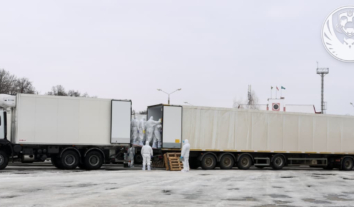In Ukraine more than 450 jobs are still banned for women – report
In Ukraine more than 450 occupations are still banned for women, which severely violates women’s right to work, to equality with men in employment, to non-discrimination.

As stated in the alternative report entitled “Women of Ukraine: between the new challenges and old discrimination”, which was prepared by the Anti-Discrimination Centre “Memorial” with the support of the Center for Social and Gender Studies (Kyiv).
This report was submitted to the UN Committee on the Elimination of Discrimination against Women and will be examined at the 66th session of the Committee in February 2017.
According to the report, women of Ukraine are forbidden to work in a number of important sectors such as various underground works, driving several types of freight and passenger transport, working in the engine compartment of the ship, and in a number of construction works. More than 450 occupations – among them are those in which women are interested. Those are well-paid and interesting jobs: metro driver, motor mechanic on the ship, the driver of long-distance bus. Such restrictions still exist in many former Soviet republics (Belarus, Russia, Armenia, Georgia, Central Asian Republics), it is discriminatory legacy of the Soviet past, which prevents professional realization of millions of women.
Human rights defenders state that in judicial practice there is no legislative way to appeal against this form of discrimination against women, which negates efforts to implement anti-discrimination law.
The report notes that the resolutions of the Ministry of Healthcare “On approval of the List of Rough Labor and Work under Unsafe and Hazardous Condition of Work where Women’s Labor Is Prohibited” (as of December 29, 1993) and “On approval of Marginal Norms for Lifting and Moving Heavy Things by Women” (as of December 22, 1993) are still not canceled.
Human rights defenders point out that the prohibition of lifting weights can serve as the formal basis for denying a woman in an interesting work for her and offer that instead of a prohibition there must be enacted measures to protect women’s health and – if necessary – warnings on the risk for health. In addition, a ban on a variety of “occupations” for women is contrary to Art. 17 of the Law of Ukraine “Ensuring Equal Rights and Opportunities of Women and Men in the Work Place and Remuneration” (№2866-IV as of September 8, 2005).
Thus the mechanism of implementation of framework regulatory act for achieving equality between women and men in employment is not developed and the contradiction between old and new legal norms is not eliminated.
Also, according to the report, discrimination against women is exacerbated by the economic crisis, aggression by Russia, further military operations in the east.
So, women, inhabiting areas of Ukraine affected by war, are caught in a difficult situation. Many women are forced to leave their homes without men, taking children to a safe place. Lack of funds, together with difficulties of placing children in kindergartens, search for jobs and housing, experienced all women – internally displaced persons (IDPs). It was even more difficult for Romani migrants, who fled from the aggression and demolitions: due to lack of education, problems with documents and biased attitude families with many children often faced difficulties in obtaining IDP status, social support, and their children could not continue their studies at school.
The report also notes the high risks for women from LGBTI community, who are on the territories controlled by the “DPR” and “LPR” and in Crimea, due to the homophobic laws, which were adopted in these areas and the growing intolerance in society. In the most difficult situation are transgender women who have remained without access to hormone therapy and who were subjected to constant checks of personal documents and had no opportunity to leave to a safe area.
In the recommendations of the ADC “Memorial” and the Center for Social and Gender Studies urged the Ukrainian authorities to abolish discriminatory list of prohibited occupations for women, attend to IDP women, especially those who belong to vulnerable groups, to take effective measures in support of Ukrainian labor migrants abroad and to reintegrate those who returned from labor migration.















